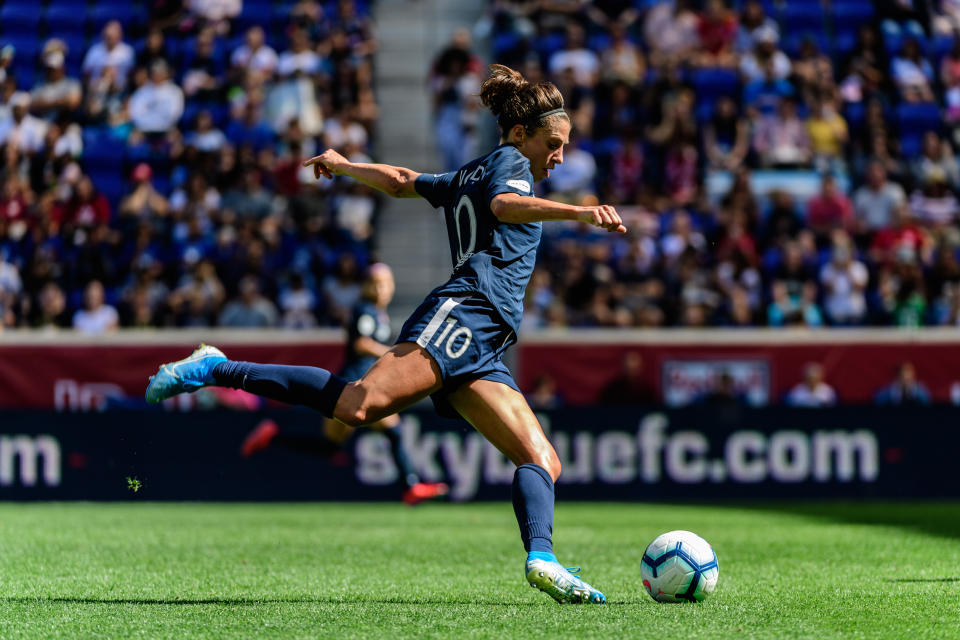Why expansion might not be the NWSL's best path forward

Although the National Women’s Soccer League playoffs start this weekend, there is a bigger story inching toward an inflection point. The league, as always, is looking at expansion, which would see the nine-team NWSL add at least one new team for 2020.
An announcement could come by the end of this month to coincide with the buzz of the NWSL Championship, sources tell Yahoo Sports, and it would be hailed as a sign of progress for the still-growing 7-year-old league.
But, for as much as expansion is the most popular topic among NWSL observers —perhaps even more than the actual soccer being played — it may be the wrong discussion. Should the NWSL be adding new teams when it still feels like two separate leagues: one for the haves, and one for the have-nots?
On one end of the spectrum, the NWSL has the Portland Thorns, which is arguably the world's flagship women’s soccer club. The Thorns drew 24,521 fans over the weekend in their regular season finale, putting their 2019 average attendance at 20,098, which makes them one of the most popular soccer teams in the U.S., men’s or women's. Owned by former U.S. Treasury secretary Hank Paulson and his son Merritt, and part of the Portland Timbers organization, the Thorns’ players want for nothing and the team has no trouble attracting world-class talent.
[ Follow Yahoo Soccer on Twitter and Facebook ]
But then there are still NWSL clubs like New Jersey-based Sky Blue FC, which have languished for years under absentee ownership that players have said treat the team like a tax write-off rather than a real investment. The player facilities have been unsanitary, the game day experience has been sub-par and, perhaps worst of all, Sky Blue, which plays at the Rutgers campus in Piscataway, New Jersey, has dibs on the New York City market, preventing another NWSL from tapping into the country’s largest city.
Expansion would look good for the NWSL. It would show the league is growing, it would expand the league’s national footprint to attract advertisers and broadcasters, and new owners would pay an expansion fee. Whichever ownership group wins an expansion slot first — ones from Louisville, Sacramento, Atlanta and Los Angeles are considered top contenders — they would join the growing class of NWSL teams that are run primarily by deep-pocketed rich people who also run men’s sports teams.
But that doesn’t do much to fix the league's Sky Blues, the teams that make the competition worse and cast the shadow of poor optics on the entire league as they struggle to attract fans and gain traction in their local areas.
What the league should instead do is replace its worst teams with new ones. Just look at it as quasi-expansion: The league can still say it’s attracting interest from new ownership groups, and fans can still use that “expansion” buzzword, but the number of teams would remain the same.
There is a precedent in the NWSL of doing just that.
Back in 2017, FC Kansas City had failed to meet required minimum standards to the point that the NWSL, after repeated warnings, took back the club’s NWSL rights and facilitated a move to Utah, where the owners of Real Salt Lake absorbed the team. That team is now the Utah Royals, and after years of players not having access to real medical facilities in Kansas City and having to travel to games without the minimum number of roster players, they are treated like true professionals in Utah.

The Western New York Flash likewise were sold and relocated to North Carolina, where they became the Courage and instantly saw an increase in attendance and relevance in their market, as well as higher standards.
That model — relocation rather than expansion — makes far more sense given the disparate state of the NWSL right now. And there are buyers out there.
Jean-Michel Aulas, president of Olympique Lyon — the other marquee women’s soccer club in the world — said last week that he was in discussions to take over an NWSL team and he hoped to have the deal in place for the 2020 season.
There is reason to be slightly skeptical — FC Barcelona has also said for years they want an NWSL team, but there seems to be a fundamental misunderstanding about how a salary-cap, single-entity league operates compared to a European club. But attracting the likes of Lyon and Barcelona is a good start.
To be sure, removing existing franchises is in many ways a brutal route for a league to take. FC Kansas City, despite its front office woes, was well-supported, and the move to Utah meant ties were easily severed for existing fans. But it’s a necessary growing pain.
Any expansion plan that involves relocation rather than simply adding teams would be more forward-thinking and pragmatic if the NWSL plans to exist for another seven years and beyond. After all, if you wanted to turn your house into a mansion, you’d make sure the foundation was solid before you start adding extra levels, right?
The NWSL’s foundation isn’t set yet, and with the different types of ownership groups at the table — the ultra-wealthy wide-eyed optimists vs. the conservative long-timers who’ve seen women’s soccer fail before — the league cannot pull in the same direction.
Clubs that aren’t willing or can’t afford to be ambitious as others need to exit. NWSL fans need to know that when they tune into a game on Yahoo or they attend one in person, they will be getting the same standard of product. That isn’t the case right now, and expansion doesn’t fix that.
And then there were four: NWSL playoffs start next
While expansion remains up in the air, the NWSL’s four-team postseason is set with the playoff semifinals set to begin Sunday.
The favorite to land in the NWSL Championship and repeat remains the powerhouse North Carolina Courage, the No. 1 seed. They will host No. 4 seed Seattle Reign, who snuck into the postseason with a run of collecting points in four of their final five games of the season, including a crucial must-win against the Utah Royals.
The Courage only lost once last year, and it seemed that they were less invincible this season with five losses. But they managed to set a new scoring record over the weekend, reaching 54 goals in one 24-game regular season, showing they remain dominant, even if it’s in a different way.
This match-up doesn’t bode well for the Reign.
The Courage score most of their goals in the final 15 minutes of games, and wouldn’t you know it, the Reign concede most of their goals in that same time period. Even if the Reign hang on for 75 minutes, weathering the storm that is the NWSL’s best attack for the full 90 minutes is asking a lot of the Reign, one of the lower-tier defenses of the league’s playoff contenders.

Meanwhile, the No. 2 vs. No. 3 matchup is more intriguing. The No. 2 Chicago Red Stars will host the Portland Thorns in a match that looks much more difficult to predict.
The Red Stars have not beaten the Thorns since 2013, the inaugural year of the NWSL. Yet there is good reason to believe the regular season’s final standings and view Chicago as the better overall team.
No one has a better shot-to-goal conversion rate than the Thorns, and the Portland attack remains an effective weapon. But on the other hand, the Chicago Red Stars have Sam Kerr, the best attacking player in the league (and arguably the world).
Rather, where there’s a real gap between Chicago and Portland is on the defensive side. The only teams that have faced more shots than Portland are the two bottom teams in the league, Orlando and Sky Blue. The season-ending injury to defensive midfielder Gabby Seiler in August certainly didn’t help, but the Thorns defense has looked disjointed and for much of this season, leaving frequent gaps for scoring opportunities.
The Red Stars have never lost when scoring first this year, and they have been better than any of team in the league at scoring within the first 15 minutes. In other words, don’t tune in late to this match or you may have missed the deciding goal.
Caitlin Murray is a contributor to Yahoo Sports and her book about the U.S. women’s national team, The National Team: The Inside Story of the Women Who Changed Soccer, is out now. Follow her on Twitter @caitlinmurr.
More from Yahoo Sports:

 Yahoo Sports
Yahoo Sports 
